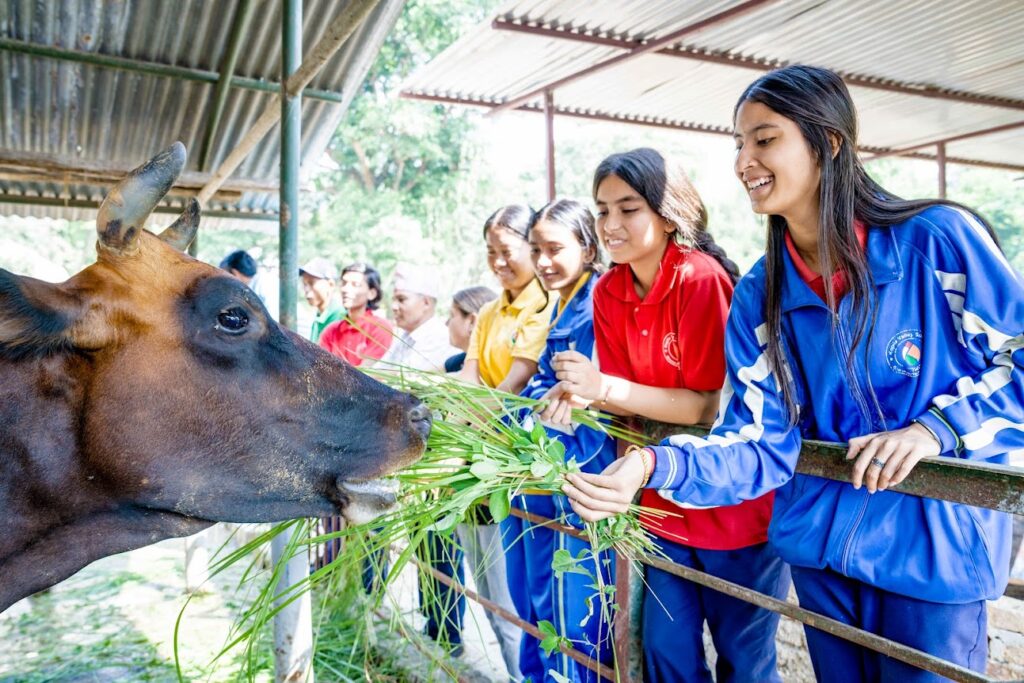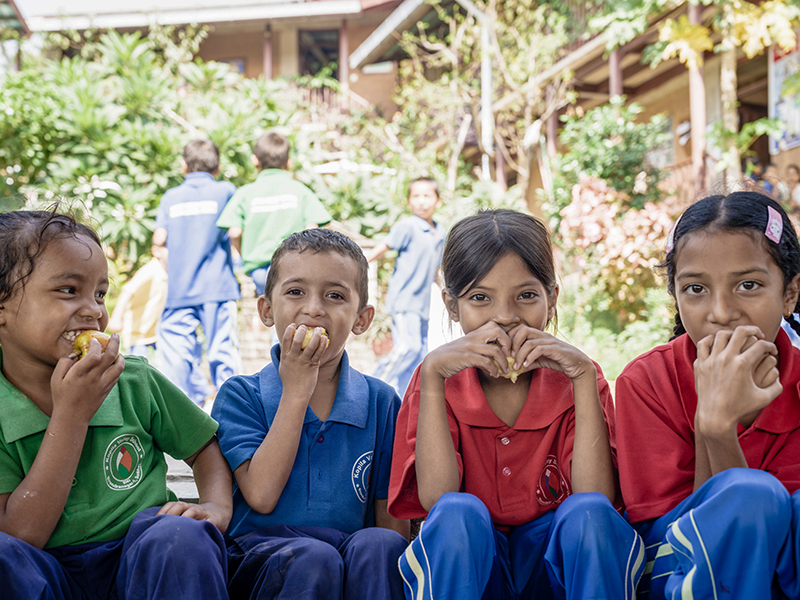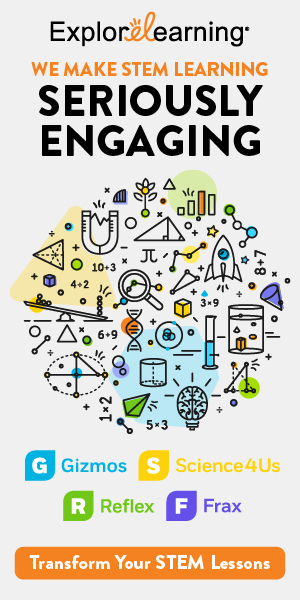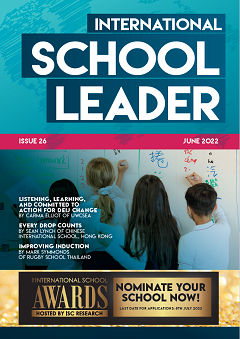By Sunita Bhandari and Rajen Karki
Education and a healthy life go hand in hand. We have seen this to be true in our work with our under-resourced region in Nepal, so our school team set out to address the needs of the whole child to prepare them for success in life.
Kopila Valley School serves 400 of the most vulnerable and at-risk children from the region each year using a holistic approach, with a major focus on experiential and place-based education.
Since our school is rooted deeply in community relationships, we have created programs as new needs surface. One of these is our healthy lunch program and agriculture initiatives – a symbiotic relationship with the school and local farmers that represents a holistic approach to community development. This partnership has allowed us to integrate education with nutrition, food security, and economic development.
Nutrition: A Sustainable Foundation
We began with sustainability in mind, both in our school’s physical structures and its organizational substructure. This meant we built a school campus which incorporated several aspects of sustainable design in its building, while also having strong foundational sustainable ethics built in its programs. Thus a strong culture of sustainability arose as a natural extension to the vision of building a model for a sustainable school.
Our school lunch program started in order to address the nutritional needs of the students, with meals sourced from our school garden and from local farmers, designed on a seasonal basis to align with local agriculture practices and access foods of the highest nutritional value.
To increase awareness of the importance of a nutritional diet, we have been conducting various classes for our students and teachers. We have integrated nutrition and sustainable lifestyle concepts into the academic curriculum – we call it Education for Sustainability (EfS) – as well as focused gardening classes to learn about growing healthy food.
Some courses are more focused on the cooking and kitchen staff, so that they may increase their knowledge and implement mindful cooking techniques to preserve the food’s nutritional content.
Partnering with Farmers
In our community development work, we have partnered with a group of women farmers to form a PGS (Participatory Guarantee System) group. We have committed to ongoing purchases that sustain their livelihoods, we provide marketing assistance and regenerative agriculture training with other local partners, and the farmers provide us organically grown and high-quality food. We incorporate a variety of food items, and we recently began prioritizing the inclusion of local indigenous crops so that our lunch is very nutritionally rich. We are mindful that, in collaboration with these local farmers, we are creating a sustainable food system through our school lunch program.
We have also opened our campus as a teaching center for organic farming practices. Our Sustainability Team encourages healthy farming and gardening by offering training courses in rooftop farming, vermicomposting, nutrition, and kitchen gardening to caregivers and the broader community. These have been received with enthusiasm, and we have watched many people implement their new knowledge and begin home gardens immediately.
In addition to our focus on purchasing local foods, we prioritize the local procurement of other necessary supplies wherever possible in our operational system.
“In collaboration with these local farmers, we are creating a sustainable food system through our school lunch program.”

Photo: Kopila Valley Students on school farm
Holistic Programming and Impact
We continuously assess and track the nutritional status of the students. More than 60% of the daily nutritional needs of the students are met through our school lunch and snacks program. For students who are under the age of five years, we track weight to age ratio and height to weight ratios. For those who are above five years of age, we track their body mass index (BMI). In 2023, 90% of the children we evaluated had an increased BMI.
With the support of the BlinkNow Foundation, we have different programs designed to address the needs of each child. To further the thriving of each child, we have a Health and Wellness program to address the physical and mental health of the children. The Futures Program supports the students in enhancing their hard and soft skills for future careers. Likewise, we have women’s empowerment programs where guardians of our students are empowered through different vocational training courses, so that they have better access to more income opportunities.
Nutrition and Education
Our goal is to spark change and help children thrive, as well as to share our proven model so that more communities may replicate a similar school “food and farming” initiative. Three steps we suggest for other schools:
- Invest in a healthy mindset/culture. Having a clear framework for ‘what we need’ nutritionally is the initial step needed; simultaneously, we empower our school family to make more informed choices for healthy diets. Our curriculum includes nutrients and health concepts, and through a permaculture-based gardening class, students are engaged in hands-on food and farming activities. Timely sessions teaching nutrition for our staff and culturally respectful food menus have been the key to strengthening our efforts.
- Build relationships with farmers/leverage local partnerships. Our essential food system question has been, “How can we source our food locally, strengthening our relationship with people, place, and the ecosystem for social, economic, and ecological well-being?” We strive for regenerative cultures which are about thriving together. We are invested in deepening our relationships and trust with local indigenous farmers, together with strong support mechanisms.
- Share with the community. This program goes far beyond the school and is driving community development. Nutrition and gardening training programs are shared with the community so that students and staff may involve their families and neighbors, which has increased healthy lives all across the municipality.


Rajen Karki is the Principal of Kopila Valley School. You can connect with him on LinkedIn.
Sunita Bhandari is the Sustainability Coordinator for Kopila programs in Surkhet, Nepal. You can connect with her on LinkedIn



